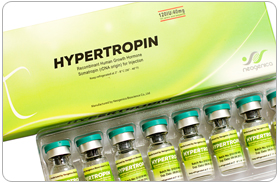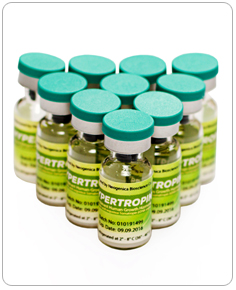Pharmaceutical product for adult growth hormone deficiency
This growth hormone (GH) product is designed to supply patients with a growth hormone deficiency, with an exact replica of the pituitary hormone, for supplementary injection in the treatment of aGHD.
The product is suitable for treatment in adults, whether they have experienced a GH deficit since childhood, or whether the GH deficit is an adult onset deficit.
Use the information provided below as a guide to some of the products on offer for the management of GH deficiency, and discuss these treatment options with your doctor.
Always speak with your doctor about the possible risks, benefits and side effects of a GH replacement therapy.
What patients may benefit from therapeutic treatment with Hypertropin?
 Hypertropin is an effective treatment for the long term management of reduced growth as a result of diminished endogenous GH. This is also known as early onset GH or pediatric GH.
Hypertropin is an effective treatment for the long term management of reduced growth as a result of diminished endogenous GH. This is also known as early onset GH or pediatric GH.- The medication is also appropriate for treatment of limited growth due to renal insufficiency up to the occurrence of a renal transplant. The GH treatment will be offered in conjunction with other medications and therapies for the best possible management of the condition.
- Hypertropin can lessen the growth deficits that may occur as a result of Turner’s syndrome.
- Hypertropin can also be used to supplement the levels of endogenous GH in adult patients, provided they meet two set criteria.
- Firstly, they must show a limited GH response to a GH stimulation test.
- Secondly, if for adult onset, patients must show decreased levels of GH, and other pituitary hormones, as a result of intra cranial radiation, surgery, pituitary disease or trauma. If for child onset, adult patients must show that they still do not show appropriate levels of endogenous GH.
Safety information for Hypertropin
 Treatment with Hypertropin must not be used on cancerous patients. Patients, who present cancer or tumors during GH treatment, should immediately cease to take the GH medication.
Treatment with Hypertropin must not be used on cancerous patients. Patients, who present cancer or tumors during GH treatment, should immediately cease to take the GH medication.- Hypertropin should not be used for the treatment of acute and critical illness as a result of open heart surgery, respiratory distress or failure, or as a result of severe accident trauma.
- Prader-Willi patients who are very obese and having respiratory problems, should not take Hypertropin or GH therapy. Prader-Willi patients should never take GH medication, unless they also present with an endogenous GH deficiency. GH therapy is not a valid long term option for the treatment of Prader-Willi patients.
- Patients who have had past occurrences of intra cranial lesions will need to be monitored closely during GH treatment to ensure that there are no lesion re emergences.
- Patients taking GH, who experience vomiting, headaches, vision changes and nausea, may be experiencing intracranial hypertension. If you experience any of these side effects, seek immediate medical attention.
- Diabetics should be closely monitored while taking GH, as GH may alter the body’s response to insulin.
- A small percentage of people talking GH may develop antibodies to the protein. This can occur in any therapeutic protein treatment.
- Any sign of an allergic reaction to the medication (rash, hives, itchiness) should receive immediate medical attention.
- Your doctor should monitor your progress closely. You may be required to reduce your dosage, should you present with side effects, or with raised levels of IGF-I proteins.
- There have been no clinical trials done for the long term efficacy and safety of GH treatment in adults; so long term effects are not yet fully known.
- Pregnant women and nursing mothers should consult with their doctor about the possibility of continuing GH treatment.
- The most common side effect occurrence is joint pain and joint swelling; this presents due to an incorrect dosage, and is not serious. Your doctor will adjust your dosage should you experience this side effect, and it should disappear.







